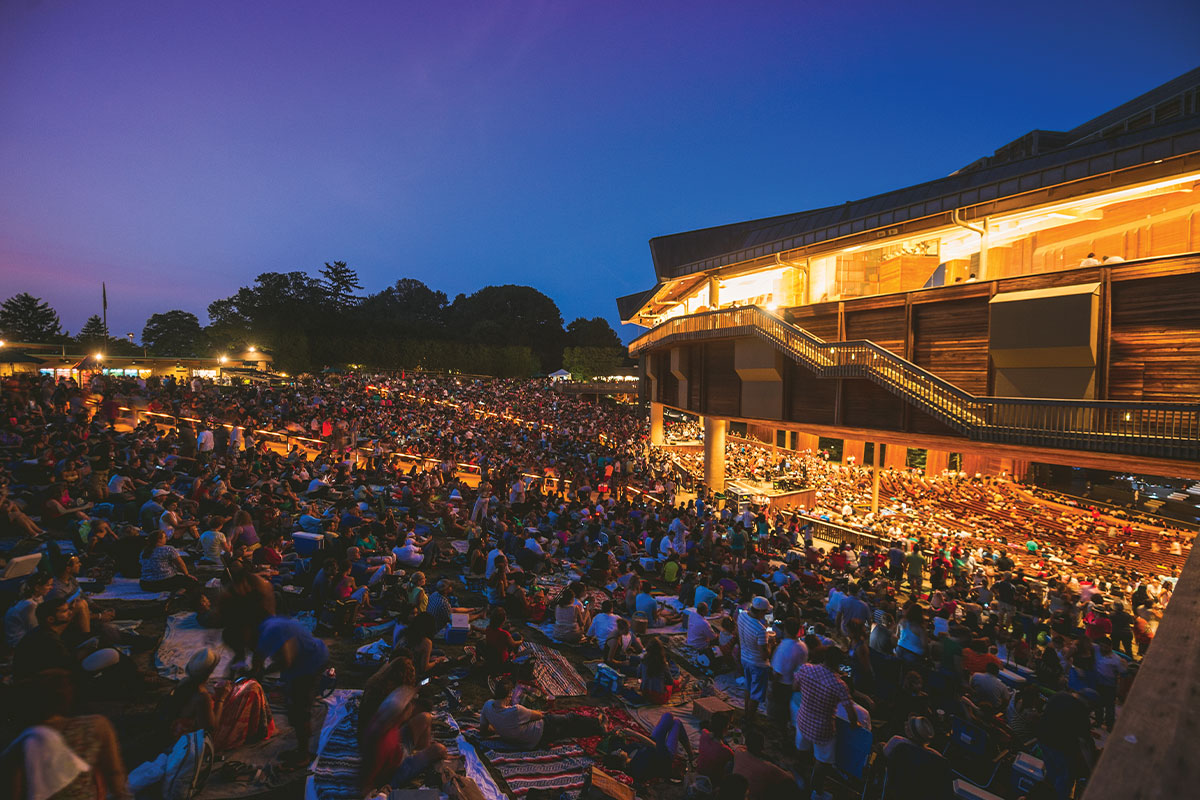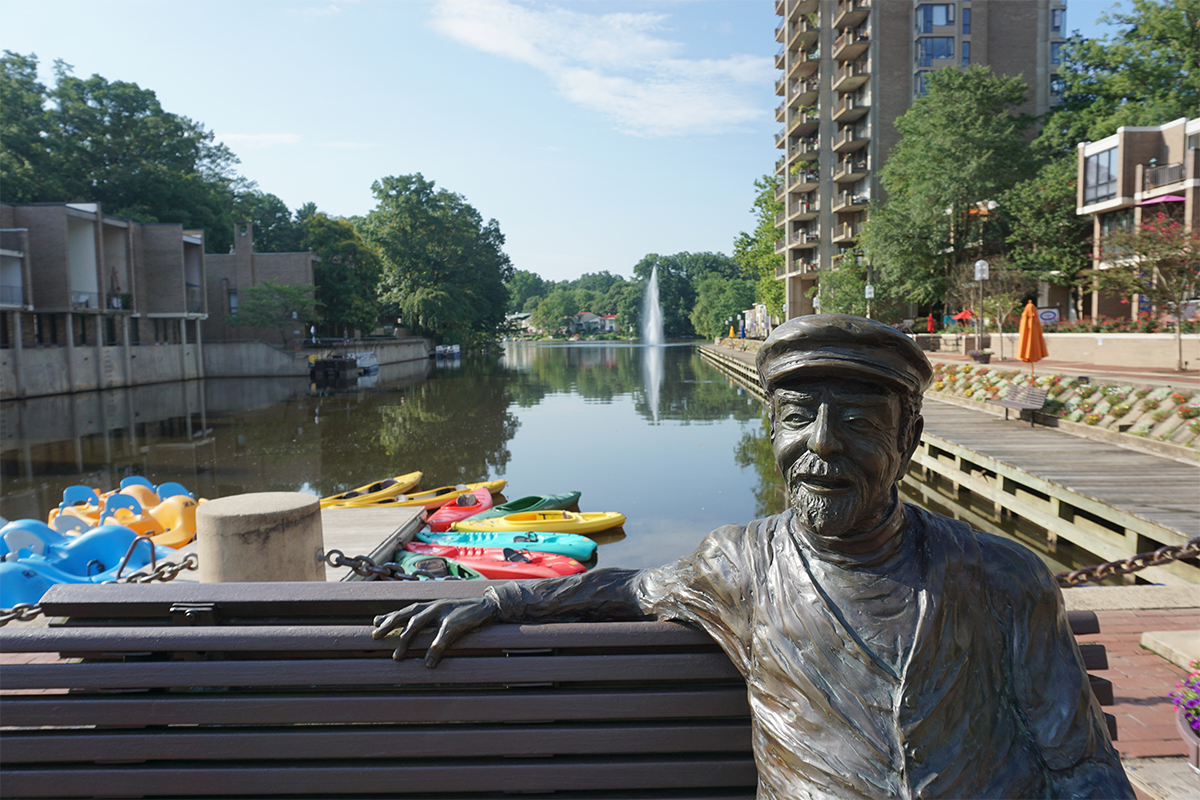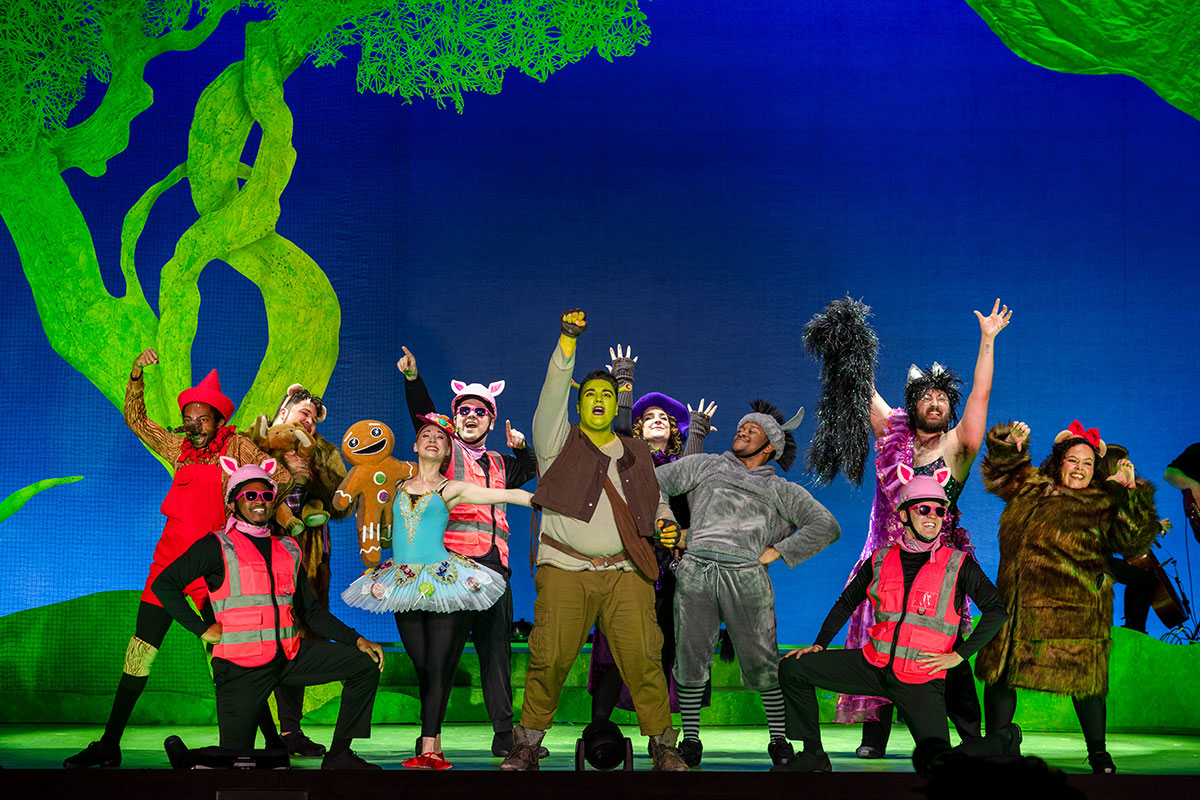Growing up, did Mark Vande Hei ever dress up as an astronaut for Halloween?
“Never,” he laughs, adding that’s the first time anybody’s asked him that. “As a kid, I thought of astronauts like superheroes. I always thought space exploration was cool, I was interested in it, but even letting myself dream about being one someday felt like [wanting to be] Spider-Man.”
Today, the Falls Church–born Vande Hei isn’t just an astronaut, but a record-setting one. When he returned from 355 consecutive days in space this past March, he set an all-time record for Americans.
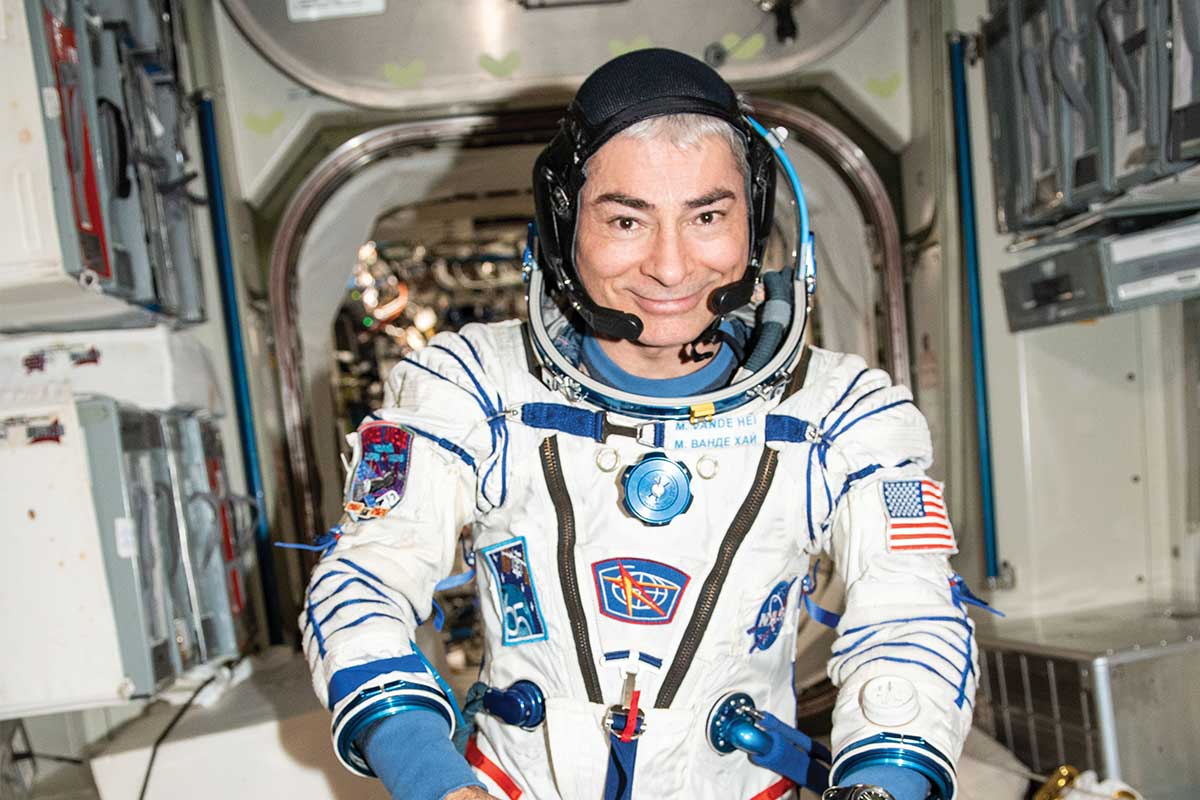
On the Launch Pad
Vande Hei’s family moved around during his childhood because his father served in the military. After being born in Virginia, Vande Hei spent much of his childhood in New Jersey and Minnesota. Yet he says that after following his dad’s footsteps and entering the military, when he was stationed at Fairfax County’s Fort Belvoir early in his Army career, “it felt like coming home.”
Vande Hei says he became an astronaut almost by accident.
After graduating from college, where he was enrolled in the ROTC program, Vande Hei enlisted in the Army and served two deployments in Iraq during the 1990s and 2000s. Upon earning his master’s degree in applied physics from Stanford University, he became operations officer for the Army’s 1st Space Battalion at a military base in Colorado.
Then, he worked for Johnson Space Center in Houston as a capsule coordinator, a mission-control employee who communicates directly with astronauts in space. He now lives in the Houston area.
Despite having spent years working in space-related occupations, Vande Hei didn’t seriously consider becoming an astronaut himself. He says he almost didn’t apply, but his wife, Julie, convinced him to give it a shot.
“I probably broke with tradition here, but I applied when I was pretty old,” says Vande Hei. “So I made sure to talk about physical things I was still doing, to give them some evidence I could still do this job in my early 40s. Every time I mentioned a job I did, I also mentioned a hobby I was involved in at the time,” like exercise and backpacking.

Liftoff
After retiring from the Army as a colonel in 2016, Vande Hei embarked on his first space mission in 2017, which lasted about five-and-a-half months. That had nothing on Vande Hei’s second and most recent mission to the ISS: 355 days.
This marked the longest spaceflight ever by an American, beating Scott Kelly’s prior record of 340 days. Kelly, with more than 5 million Twitter followers, congratulated Vande Hei publicly on the platform using some wry humor: “Mark, take it easy and don’t overdo it. You’ve been away from the good Earth for a long time.”
Russian cosmonaut Valeri Polyakov holds the overall record for consecutive spaceflight at 437 days, set in 1994 and 1995.
I had to know: While living in space for that long, was Vande Hei perpetually in awe? Or, after a few months, did it just become his new normal?
“It became my new normal,” Vande Hei admits. “But the times where I felt that sense of awe again were waking up before the rest of my crewmates, going to the Cupola, which is the ISS observatory module, and looking out the window while meditating for 20 minutes. You’re always going over a different part of Earth. Even if it was a part I’d seen before, the weather would be different, lighting would be different. And the view of the stars at night was amazing.”
Two of Vande Hei’s crewmates were Russian, Oleg Novitskiy and Pyotr Dubrov. As they finished their journey through space, Russia invaded Ukraine down below.
Dmitry Rogozin, head of Russia’s space agency Roscosmos, had implied he might let the ISS fall out of orbit as retaliation for America’s support for Ukraine. Fortunately, that didn’t happen, although Russia did announce in July that it would drop out of the ISS partnership after 2024.
Some 248 miles above Earth, though, everything remained copacetic.
“My Russian crewmates are dear friends, they will always be dear friends, and there’s varying levels of discomfort for them as well about the situation. But we had a job to do,” Vande Hei told NBC News. “I did bring [the situation] up with my crewmates. Really, all I feel comfortable saying is there were a variety of responses.”
There were lighter moments, too. Asked for his funniest story from space, Vande Hei tells an anecdote that probably shouldn’t be repeated in a family-friendly publication. Just know that it takes place in the bathroom portion of the space station, and ends with one of his fellow crewmates angrily yelling, “VANDE HEI!”
“When we’re laughing so hard we’re crying up there, the tears don’t float around,” Vande Hei says. “They just pool up on your eyes.”
He tried his best to remain connected to home. Once a week, Vande Hei would video-call his wife and two adult children — his son in Boston and his daughter in Washington state. Vande Hei and his crewmates also watched the Olympics together; the delayed Summer 2021 Games and Winter 2022 Games both occurred during their space mission.
The crew also did a fair amount of physical activity. Astronauts are required to exercise for two-and-a-half hours a day to mitigate the effects of zero gravity on their muscles and bones. The crewmates curated a collaborative Spotify playlist of songs from their home countries for everyone to listen to while working out.
Vande Hei has now spent 523 total days in space, the third-most by an American, behind only Peggy Whitson with 665 and Jeff Williams with 534. Russian cosmonaut Gennady Padalka holds the overall record with 879.
And if you’re wondering about the close quarters up there when it comes to COVID-19, Vande Hei was vaccinated against the virus before his April 2021 departure from Earth.
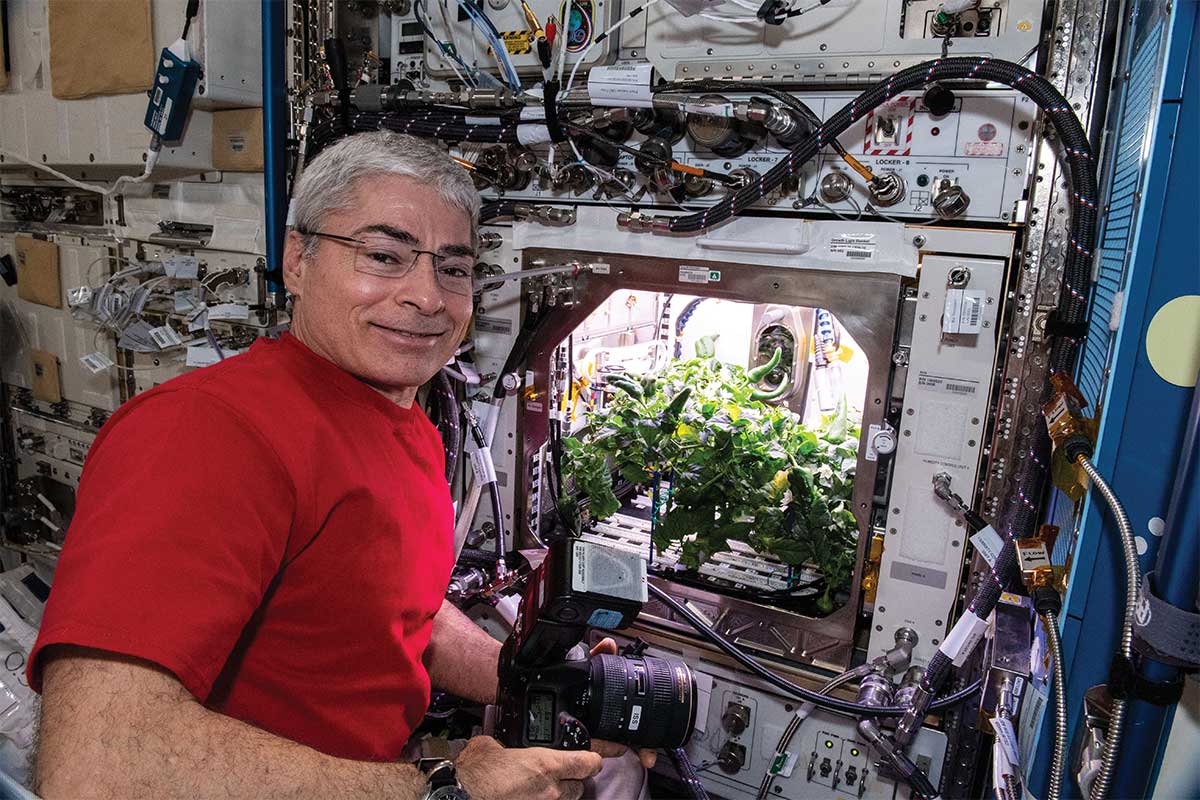
In the Spotlight
When people ask him, “What do you do?” at parties, Vande Hei doesn’t readily volunteer that he’s an astronaut.
“If you throw that out right away, you’ll look like you’re bragging, so I typically don’t offer that up until a few questions in,” he says. “But when I say I work for NASA, people say, ‘So what do you do there?’ and I have a hard time answering that without saying I’m an astronaut.
“People have a lot of enthusiasm,” Vande Hei continues. “I couldn’t have done this job without a lot of taxpayer dollars,” so once he tells people he’s an astronaut, “my next job is to make those taxpayers realize what we’ve done.”
For example, recent science experiments conducted during his missions include studying how microgravity impacts the growth and structure of plant roots, plus its impact on microbial virulence and immune system responses.
Asked for his favorite fictional portrayal of space, Vande Hei offers two films: Deep Impact on the more fantastical end, and the Neil Armstrong biopic First Man on the more realistic end. Vande Hei got to meet First Man director Damien Chazelle and complimented him on the lighting of the spacecraft in the film during the orbit scenes.
“All sunlight on Earth is scattered by the atmosphere,” Vande Hei explains. “That’s why we see blue; that’s why there are sunsets and sunrises.” The film “had a NASA adviser who suggested they use point lighting, so the sun acts like a giant spotlight. It’s beautiful, and I’d felt it when I was in space but didn’t even know how to explain it to myself.”
Vande Hei helped a film production crew himself — while in space. The upcoming Russian drama The Challenge will become the first feature-length film with sequences shot in space, as the director and actress Yuliya Peresild actually spent 12 days onboard the ISS together with Vande Hei.
“We get about 45 minutes of daylight on a typical pass over the sunlit side of the Earth,” Vande Hei explains. “They finished getting their shots of the actress with Earth in the background. When we went into Earth’s shadow, they looked like they were calling it quits because they wanted to get shots with sunlight.
“So I said, ‘Wait a minute,’” Vande Hei continues. “I turned off all the lights in the vicinity and told them to keep looking out. Once they saw the view of Earth at night with stars in the background, they got real quiet. That made me feel like they were getting it.”
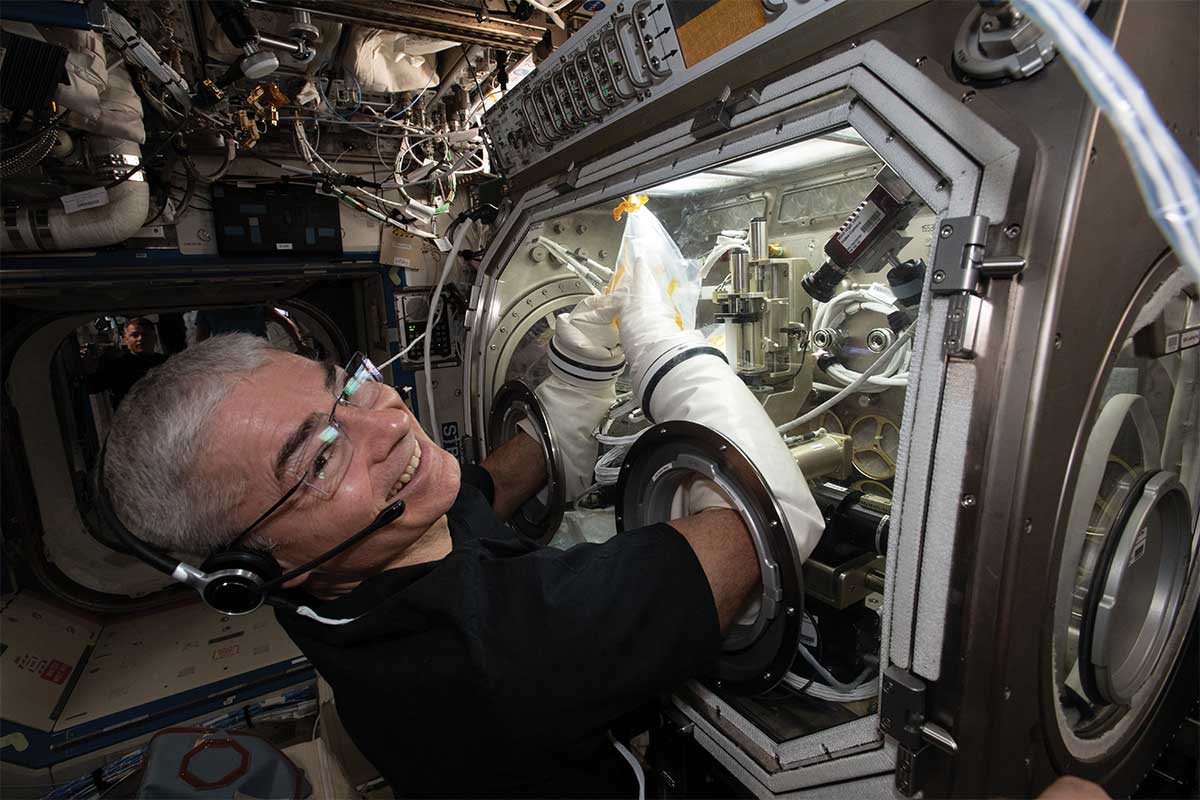
The Symphony
Vande Hei kept a journal during his almost year-long mission, sharing selected excerpts on Twitter from his account @Astro_Sabot. Asked to share a journal excerpt that he hasn’t yet revealed publicly, Vande Hei relates a story about a time he was scheduled to participate in a spacewalk, but couldn’t because of a pinched nerve.
Astronauts always wear a cuff display with an information screen on the wrist of their spacesuit for spacewalks, and they will often put a photo of a family member there, to show to the camera. On his spacewalk, French crewmate Thomas Pesquet had a photo of a man older than himself.
“I assumed it was his dad,” Vande Hei says. American crewmate “Shane Kimbrough was with me, he couldn’t see it well enough, so he took a picture of it. When we zoomed in, we realized it was a picture of me,” Vande Hei marvels. Pesquet “symbolically took me on the spacewalk, as a gesture of kindness.”
Perhaps such stories of harmony and communal achievement amid the vast expanse of the cosmos can inspire us to better exercise those same qualities down on terra firma.
Astronaut Charles Walker once described his first view of his home planet from outer space as lacking a crucial element.
“I held my breath, but something was missing — I felt strangely unfulfilled. Here was a tremendous visual spectacle, but viewed in silence. There was no grand musical accompaniment; no triumphant, inspired sonata or symphony,” Walker said. “Each one of us must write the music of this sphere for ourselves.”
Vande Hei, it appears, has written score of moving internal music, and we hear his notes loud and clear.
This story originally ran in our November issue. For more stories like this, subscribe to our monthly magazine.



